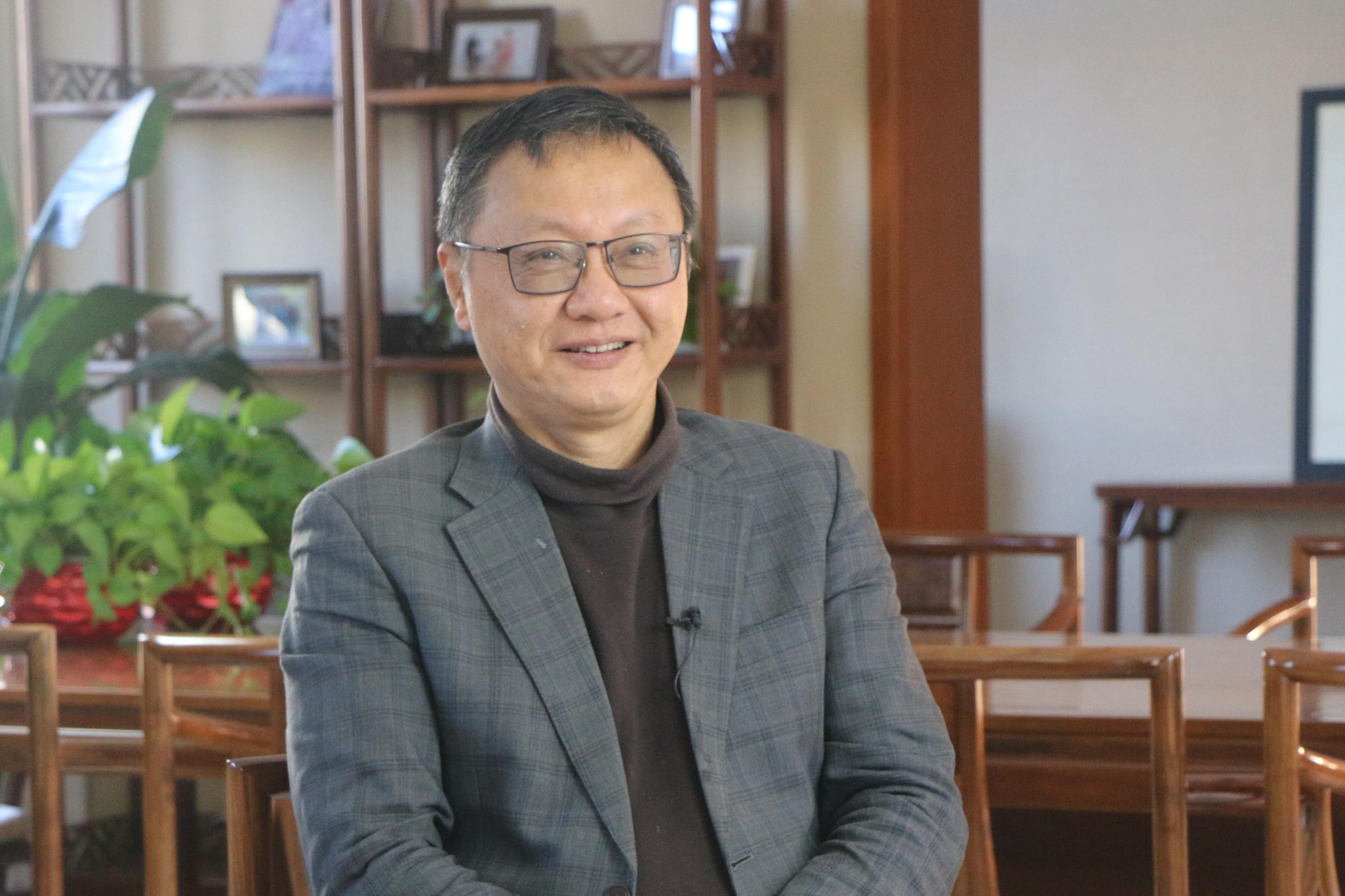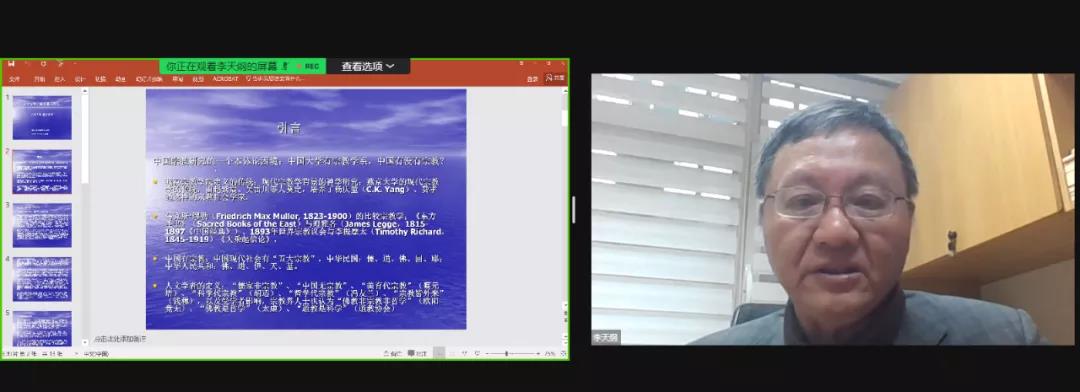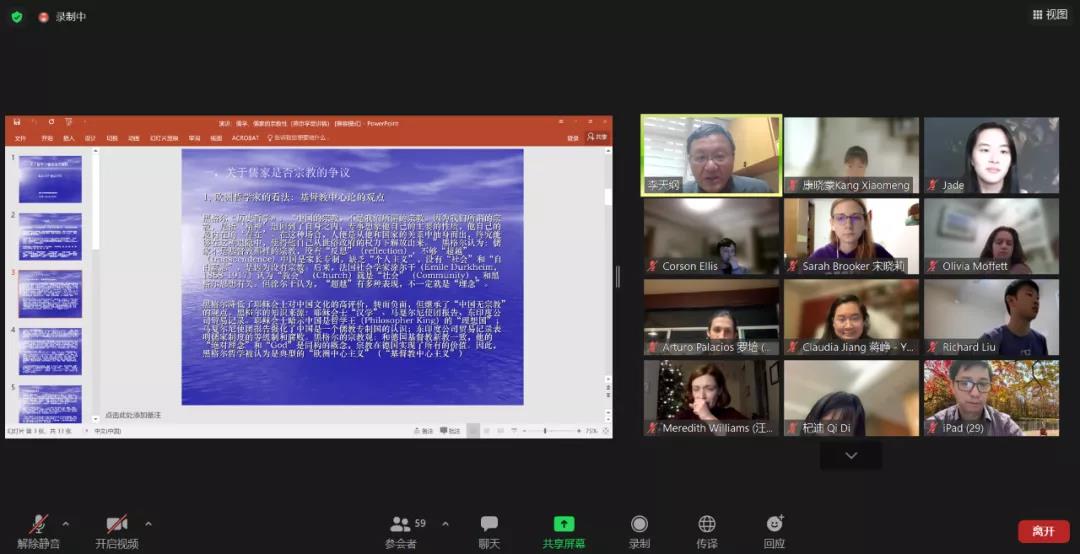On the morning of December 9, Professor Li Tiangang from the School of Philosophy, Fudan University, gave a lecture titled “On the Religiosity of Confucian Learning and Confucianism.” It was the fourth lecture in the 2021–22 academic year’s Topics in China Studies Lecture Series and chaired by Professor Lu Yang, Director of Graduate Studies of the Yenching Academy.

In an interview before the lecture, Prof. Li called for equal attention to the spread of Chinese culture across the West since academic research has concentrated on spreading Western learning in China. He remarked that Chinese culture had a stronger influence on the West in the 17th and 18th centuries when Confucian classics and Chinese Buddhist and literary works were translated into Western languages. The professor also observed a far-reaching influence of the then craze for chinoiserie on Europe and the world, from humanities to life arts of silk and porcelain.
Prof. Li found a favorable environment for the exchange between Chinese and Western cultures in 17th-century China, where Chinese scholar-officials like Xu Guangqi and Western missionaries like Matteo Ricci forged friendships. Chinese scholar-officials at that time were open-minded, be they in the southeast or Beijing, or influenced by Wang Yangming (Ming Dynasty statesman and Neo–Confucian philosopher) or Zhu Xi (Neo–Confucian philosopher and official of the Song Dynasty); they believed in “empathy and shared principle between the East and the West.” That is, “the wise should appreciate and befriend one another.” Prof. Li held that the shared mind is the foundation for sound cultural exchange.
Prof. Li talked about “globalism of the East.” He noted that China has been more involved in the process of globalization in the past century by adapting itself to what it absorbed and learned from the West; that is, the West has never been able to exert direct influence on China’s political, economic, or cultural development. He called this process “glocalization.” In Eastern countries, it is “globalization of the East”.
Prof. Li thought highly of the legacy of the late-19th-century overseas Chinese students like Rong Hong. He encouraged international and Chinese students to be open-minded and collaborate closely in academic, cultural, and daily matters. Prof. Li assured young students of the lifelong benefits of engaging with new ideas and cultures.

On the Lecture
“We have the department of religious studies in a Chinese university. But do we have a religion in China?” Professor Li introduced an ontological dilemma in China’s religious studies before detailing how Chinese and Western scholars saw the issue of whether Confucianism was a religion. He shed light on knowing the relationship between religion and religious studies and understanding religion’s role in Chinese culture and society.
Prof. Li first elaborated on the history of modern religious studies at Yenching University, the 1893 World’s Parliament of Religions in Chicago and its interest in China’s religion, and the relationship between the nation-state system and modern religion. Drawing upon historical facts, he described why religion drew wide attention in China and the imperative to understand the religiosity of Confucianism.
Furthermore, the professor talked about how Western Sinologists looked at the modernity of China’s religion, Christianity-centered theories, and the thoughts of Western scholars, such as Hegel, Durkheim, Voltaire, Weber, and Jan de Groot, on the issues. Prof. Li explained that Weber and Jan de Groot observed a strong belief in the supernatural in traditional Chinese culture and included sacrificial rites, festival events, and folk taboos in studying China’s religion. Prof. Li noted that this was a good way to understand the religiosity of Confucianism.
Prof. Li then turned back to Chinese scholars’ ideas on the issue, detailing theories propounded by several scholars, including Liang Qichao, Ma Xiangbo, Hu Shi, and Feng Youlan. In the early 20th century, Chinese historians and philosophers, influenced by Western humanism, tended to downplay the religiosity of Confucianism and highlighted its rationality.
He remarked that scholars like Ji Xianlin and Cai Shengsi in mainland China took new ideas on “whether there is religion in China” and “whether Confucianism is a religion.” Unlike the first-generation scholars of modern Neo-Confucianism who, influenced by the 1911 Revolution and the New Culture Movement, evaded discussions on the religiosity of Confucianism, the second-generation scholars recognized Confucianism’s religiosity vis-à-vis morality and humanism. Ren Jiyu and his followers started from historical materialism and saw Confucianism as a state religion that stemmed from the dynastic times and played a negative role in Chinese society.
In the last part of the lecture, Prof. Li looked at the origin of China’s religion issue and the definition of religious studies. He pointed that Confucianism can be defined as a religion in terms of belief, rite, and doctrine. The professor also highlighted religious studies as an integral part of the study of Chinese culture because religion in China has complied with the dominant culture through the ages. A new academic consensus is that “there is religion in China” and “Confucianism has religiosity in it.” Drawing upon this, scholars are stepping up efforts for religious studies and teaching in modern China.
